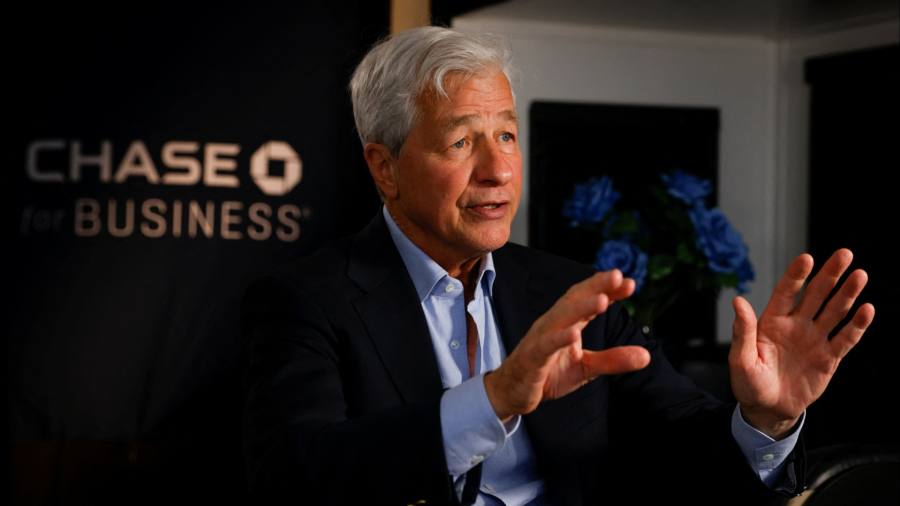
Jamie Dimon has identified JPMorgan Chase’s former general counsel as the “ultimate decider” who had the authority to axe Jeffrey Epstein as a client, according to sworn testimony by the bank’s chief executive.
Even if other executives such as Mary Erdoes, one of the bank’s most senior managers, had been vouching for the sex offender, the bank’s top lawyer was the person who “had the ability to override” their decisions, Dimon said.
Dimon made the assertion during a seven-hour deposition last week, a transcript of which has been seen by the Financial Times. He was responding to suggestions that the decision to retain Epstein had been made by Erdoes and Jes Staley, the disgraced financier’s former private banker.
According to the transcript, lawyers for the US Virgin Islands — which is bringing one of two cases against JPMorgan — indicated that Steve Cutler, the bank’s top lawyer from 2007 to 2016, had named Erdoes and Staley as the executives responsible for keeping Epstein on after his first arrest for sex crimes in 2006.
“If [Cutler] allowed them to make that judgment, it’s because he didn’t step in and say, you have to go,” Dimon said. “But he could have done that.”
Dimon’s deposition was taken in relation to two cases in which JPMorgan is accused of ignoring red flags relating to Epstein and benefiting from human trafficking. One has been brought by a woman who said she was abused by Epstein, and the other by the US Virgin Islands, where the late sex offender had a home.
Court filings in the two cases have detailed how Erdoes, who now runs the bank’s $4tn asset and wealth management division, and Staley, were involved in multiple internal conversations about whether Epstein should be dropped as a client, and that they personally visited his residences.
In 2011, Cutler sent an email that read: “I would like to put it and [Epstein] behind us. Not a person we should do business with, period.” He also wrote “This is not an honourable person in any way. He should not be a client.”
Epstein pleaded guilty in 2008 to a state charge in Florida of soliciting a minor for prostitution. He remained a client of JPMorgan until 2013.
“Mr Cutler had the ultimate authority to kick him out if he thought it had gone that far,” Dimon said in his testimony. “I think the ultimate decider would have been the general counsel of the company.”
Cutler, a former director of enforcement at the US Securities and Exchange Commission who subsequently left JPMorgan to go into private practice at Simpson Thacher, did not immediately respond to a request for comment.
JPMorgan said: “Had the firm believed he was engaged in an ongoing sex trafficking operation, Epstein would not have been retained as client. In hindsight, we regret he was ever a client.”
In his deposition, the 67-year-old Dimon said he first learned that Epstein had held accounts at JPMorgan for 15 years about four years ago, when the disgraced financier was arrested on federal sex crime charges.
“I don’t recall knowing anything about Jeffrey Epstein until the stories broke sometime in 2019,” Dimon said. “I was surprised that I . . . had never even heard of the guy, pretty much, and how involved he was with so many people.”
David Boies, a lawyer for the unnamed Epstein accuser suing JPMorgan, said on Wednesday that Dimon had admitted the bank’s “top executives knew for years that Epstein was a convicted sex offender who continued to target young women”.
“Epstein withdrew hundreds of millions of dollars a year in cash to fund what he was doing, and . . . used his web of JPMorgan accounts,” said Boies.
He added: “If, as he claims, Mr Dimon was the only person in New York who never heard of Epstein before July 2019, that is an indictment, not a defence.”
Dimon also denied ever being informed about Epstein’s accounts or behaviour by Staley, whom the bank is suing for allegedly withholding information about Epstein and for vouching for him internally.
Earlier on Wednesday, The Wall Street Journal reported that Staley claimed to have spoken to Dimon in person about the account on several occasions — an allegation JPMorgan described as “false”.